|
|
|
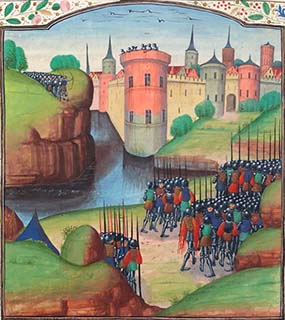

THE SIEGE OF CALAIS (1346-7)
NOWHERE does the continent of Europe approach Great Britain so closely as at the Straits of Dover, and when the
English sovereigns were full of the vain hope of obtaining the crown of France, or at least of regaining the
great possessions that their forefathers had owned as French nobles, there was no spot so coveted by them as
the fortress of Calais, the possession of which gave an entrance into France.
Thus it was that when, in 1346, Edward III had beaten Philippe VI at the
battle of Crecy, the first use he made of his victory was to march upon Calais, and
lay siege to it. The walls were exceedingly strong and solid, mighty defenses of masonry, of huge thickness
and like rocks for solidity, guarded it, and the king knew that it would be useless to attempt a direct assault.
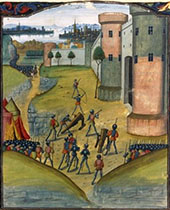 Indeed, during all the middle ages, the modes of protecting fortifications were far more efficient than the
modes of attacking them. The walls could be made enormously massive, the towers raised to a great height, and
the defenders so completely sheltered by battlements that they could not easily be injured, and could take aim
from the top of their turrets, or from their loophole windows. The gates had absolute little castles of their
own, a moat flowed round the walls full of water, and only capable of being crossed by a drawbridge, behind
which the portcullis, a grating armed beneath with spikes, was always ready to drop from the archway of the
gate and close up the entrance. The only chance of taking a fortress by direct attack was to fill up the moat
with earth and faggots, and then raise ladders against the walls; or else to drive engines against the defenses,
battering-rams which struck them with heavy beams, mangonels which launched stones, sows
Indeed, during all the middle ages, the modes of protecting fortifications were far more efficient than the
modes of attacking them. The walls could be made enormously massive, the towers raised to a great height, and
the defenders so completely sheltered by battlements that they could not easily be injured, and could take aim
from the top of their turrets, or from their loophole windows. The gates had absolute little castles of their
own, a moat flowed round the walls full of water, and only capable of being crossed by a drawbridge, behind
which the portcullis, a grating armed beneath with spikes, was always ready to drop from the archway of the
gate and close up the entrance. The only chance of taking a fortress by direct attack was to fill up the moat
with earth and faggots, and then raise ladders against the walls; or else to drive engines against the defenses,
battering-rams which struck them with heavy beams, mangonels which launched stones, sows
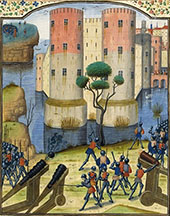 whose arched wooden
backs protected troops of workmen who tried to undermine the wall, and moving towers consisting of a succession
of stages or shelves, filled with soldiers, and with a bridge with iron hooks, capable of being launched from
the highest story to the top of the battlements. The besieged could generally disconcert the battering-ram by
hanging beds or mattresses over the walls to receive the brunt of the blow, the sows could be crushed with heavy
stones, the towers burnt by well directed flaming missiles, the ladders overthrown, and in general the besiegers
suffered a great deal more damage than they could inflict. Cannon had indeed just been brought into use at the
battle of Crecy, but they only consisted of iron bars fastened together with hoops, and were as yet of little use,
and thus there seemed to be little danger to a well guarded city from any enemy outside the walls.
whose arched wooden
backs protected troops of workmen who tried to undermine the wall, and moving towers consisting of a succession
of stages or shelves, filled with soldiers, and with a bridge with iron hooks, capable of being launched from
the highest story to the top of the battlements. The besieged could generally disconcert the battering-ram by
hanging beds or mattresses over the walls to receive the brunt of the blow, the sows could be crushed with heavy
stones, the towers burnt by well directed flaming missiles, the ladders overthrown, and in general the besiegers
suffered a great deal more damage than they could inflict. Cannon had indeed just been brought into use at the
battle of Crecy, but they only consisted of iron bars fastened together with hoops, and were as yet of little use,
and thus there seemed to be little danger to a well guarded city from any enemy outside the walls.
King Edward arrived before the place with all his victorious army early in August, his good knights and squires
arrayed in glittering steel armor, covered with surcoats richly embroidered with their heraldic bearings; his
stout men-at-arms, each of whom was attended by three bold followers; and his archers, with their cross-bows
to shoot bolts, and long-bows to shoot arrows of a yard long, so that it used to be said that each went into
battle with three men's lives under his girdle, namely the three arrows he kept there ready to his hand. With
the king was his son, Edward, Prince of Wales, who had just won the golden spurs
of knighthood so gallantly at Crecy when only in his seventeenth year, and likewise the
famous Hainault knight, Sir Walter Mauny [or Manny], and all that was noblest and
bravest in England.
This whole glittering army, at their head the king's great royal standard bearing the golden lilies of France
quartered with the lions of England, and each troop guided by the square banner, swallow-tailed pennon or
pointed pennoncel of their leader, came marching to the gates of Calais, above which floated the blue standard
of France with its golden flowers, and with it the banner of the governor, Sir Jean de Vienne. A herald, in a
rich long robe embroidered with the arms of England, rode up to the gate, a trumpet sounding before him, and
called upon Sir Jean de Vienne to give up the place to Edward, King of England, and of France, as he claimed
to be. Sir Jean made answer that he held the town for Philippe, King of France, and that he would defend it
to the last; the herald rode back again and the English began the siege of the city.
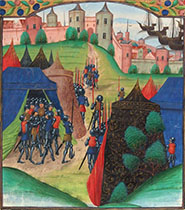 At first they only encamped, and the people of Calais must have seen the whole plain covered with the white
canvas tents, marshalled round the ensigns of the leaders, and here and there a more gorgeous one displaying
the colors of the owner. Still there was no attack upon the walls. The warriors were to be seen walking about
in the leathern suits they wore under their armor; or if a party was to be seen with their coats of mail on,
helmet on head, and lance in hand, it was not against Calais that they came; they rode out into the country,
and by and by might be seen driving back before them herds of cattle and flocks of sheep or pigs that they
had seized and taken away from the poor peasants; and at night the sky would show red lights where farms and
homesteads had been set on fire. After a time, in front of the tents, the English were to be seen hard at work
with beams and boards, setting up huts for themselves, and thatching them over with straw or broom.
These wooden houses were all ranged in regular streets, and there was a market-place in the midst, whither
every Saturday came farmers and butchers to sell corn and meat, and hay for the horses; and the English
merchants and Flemish weavers would come by sea and by land to bring cloth, bread, weapons, and everything
that could be needed to be sold in this warlike market.
At first they only encamped, and the people of Calais must have seen the whole plain covered with the white
canvas tents, marshalled round the ensigns of the leaders, and here and there a more gorgeous one displaying
the colors of the owner. Still there was no attack upon the walls. The warriors were to be seen walking about
in the leathern suits they wore under their armor; or if a party was to be seen with their coats of mail on,
helmet on head, and lance in hand, it was not against Calais that they came; they rode out into the country,
and by and by might be seen driving back before them herds of cattle and flocks of sheep or pigs that they
had seized and taken away from the poor peasants; and at night the sky would show red lights where farms and
homesteads had been set on fire. After a time, in front of the tents, the English were to be seen hard at work
with beams and boards, setting up huts for themselves, and thatching them over with straw or broom.
These wooden houses were all ranged in regular streets, and there was a market-place in the midst, whither
every Saturday came farmers and butchers to sell corn and meat, and hay for the horses; and the English
merchants and Flemish weavers would come by sea and by land to bring cloth, bread, weapons, and everything
that could be needed to be sold in this warlike market.
The governor, Sir Jean de Vienne, began to perceive that the king did not mean to waste his men by making vain
attacks on the strong walls of Calais, but to shut up the entrance by land, and watch the coast by sea so as to
prevent any provisions from being taken in, and so to starve him into surrendering. Sir Jean de Vienne, however,
hoped that before he should be entirely reduced by famine, the King of France would be able to get together
another army and come to his relief, and at any rate he was determined to do his duty, and hold out for his
master to the last. But as food was already beginning to grow scarce, he was obliged to turn out such persons
as could not fight and had no stores of their own, and so one Wednesday morning he caused all the poor to be
brought together, men, women, and children, and sent them all out of the town, to the number of 1,700. It was
probably the truest mercy, for he had no food to give them, and they could only have starved miserably within
the town, or have hindered him from saving it for his sovereign; but to them it was dreadful to be driven out
of house and home, straight down upon the enemy, and they went along weeping and wailing, till the English
soldiers met them and asked why they had come out. They answered that they had been put out because they had
nothing to eat, and their sorrowful famished looks gained pity for them. King Edward sent orders that not only
should they go safely through his camp, but that they should all rest, and have the first hearty dinner that
they had eaten for many a day, and he sent every one a small sum of money before they left the camp, so that
many of them went on their way praying aloud for the enemy who had been so kind to them.
A great deal happened whilst King Edward kept watch in his wooden town and the citizens of Calais guarded their
walls. England was invaded by King David II of Scotland, with a great army, and the good
Queen Philippa, who was left to govern at home in the name of her little son
Lionel, assembled all the forces that were left at home, and sent them to meet
him. And one autumn day, a ship crossed the Straits of Dover, and a messenger brought King Edward letters from
his queen to say that the Scots army had been entirely defeated at Nevil's Cross, near Durham, and that their
king was a prisoner, but that he had been taken by a squire named John Copeland, who would not give him up to her.
King Edward sent letters to John Copeland to come to him at Calais, and when the squire had made his journey,
the king took him by the hand saying, "Ha! welcome, my squire, who by his valor has captured our adversary the
King of Scotland." Copeland, falling on one knee, replied, "If God, out of His great kindness, has given me the
King of Scotland, no one ought to be jealous of it, for God can, when He pleases, send His grace to a poor squire
as well as to a great lord. Sir, do not take it amiss if I did not surrender him to the orders of my lady queen,
for I hold my lands of you, and my oath is to you, not to her." The king was not displeased with his squire's
sturdiness, but made him a knight, gave him a pension of 5001. a year, and desired him to surrender his
prisoner to the queen, as his own representative. This was accordingly done, and King David was lodged in the
Tower of London.
Soon after, three days before All Saints' Day, there was a large and gay fleet to be seen crossing from the white
cliffs of Dover, and the king, his son, and his knights rode down to the landing-place to welcome plump, fair-haired
Queen Philippa, and all her train of ladies, who had come in great numbers to visit their husbands, fathers, or
brothers in the wooden town. Then there was a great court, and numerous feasts and dances, and the knights and
squires were constantly striving who could do the bravest deed of prowess to please the ladies. The King of France
had placed numerous knights and men-at-arms in the neighboring towns and castles, and there were constant fights
whenever the English went out foraging, and many bold deeds that were much admired were done. The great point was
to keep provisions out of the town, and there was much fighting between the French who tried to bring in supplies,
and the English who intercepted them. Very little was brought in by land, and Sir Jean de Vienne and his garrison
would have been quite starved but for two sailors of Abbeville, named Marant and Mestriel, who knew the coast
thoroughly, and often, in the dark autumn evenings, would guide in a whole fleet of little boats, loaded with bread
and meat for the starving men within the city. They were often chased by King Edward's vessels, and were sometimes
very nearly taken, but they always managed to escape, and thus they still enabled the garrison to hold out.
So all the winter passed, Christmas was kept with brilliant feasting and high merriment by the king and his queen
in their wooden palace outside, and with lean cheeks and scanty fare by the besieged within. Lent was strictly
observed perforce by the besieged, and Easter brought a betrothal in the English camp; a very unwilling one on the
part of the bridegroom, the young Count of Flanders, who loved the French much better than the English, and had
only been tormented into giving his consent by his unruly vassals because they depended on the wool of English
sheep for their cloth works. So, though King Edward's daughter Isabel was a beautiful fair-haired girl of fifteen,
the young count would scarcely look at her; and in the last week before the marriage-day, while her robes and her
jewels were being prepared, and her father and mother were arranging the presents they should make to all their
court on the wedding-day, the bridegroom, when out hawking, gave his attendants the slip, and galloped off to
Paris, where he was welcomed by King Philippe.
This made Edward very wrathful, and more than ever determined to take Calais. About Whitsuntide he completed a
great wooden castle upon the seashore, and placed in it numerous warlike engines, with forty men-at-arms and 200
archers, who kept such a watch upon the harbor that not even the two Abbeville sailors could enter it, without
having their boats crushed and sunk by the great stones that the mangonels launched upon them. The townspeople
began to feel what hunger really was, but their spirits were kept up by the hope that their king was at last
collecting an army for their rescue. And Philippe did collect all his forces, a great and noble army, and came
one night to the hill of Sangate, just behind the English army, the knights' armor glancing and their pennons
flying in the moonlight, so as to be a beautiful sight to the hungry garrison who could see the white tents
pitched upon the hillside. Still there were but two roads by which the French could reach their friends in
the town—one along the seacoast, the other by a marshy road higher up the country, and there was but one
bridge by which the river could be crossed. The English king's fleet could prevent any troops from passing
along the coast road, the Earl of Derby guarded the bridge, and there was
a great tower, strongly fortified, close upon Calais.
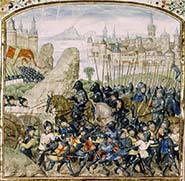 There were a few skirmishes, but the French king, finding it difficult to
force his way to relieve the town, sent a party of knights with a challenge to King Edward to come out of
his camp and do battle upon a fair field. To this Edward made answer, that he had been nearly a year before
Calais, and had spent large sums of money on the siege, and that he had nearly become master of the place,
so that he had no intention of coming out only to gratify his adversary, who must try some other road if he
could not make his way in by that before him. Three days were spent in parleys, and then, without the slightest
effort to rescue the brave, patient men within the town, away went King Philippe of France, with all his men,
and the garrison saw the host that had crowded the hill of Sangate melt away like a summer cloud.
There were a few skirmishes, but the French king, finding it difficult to
force his way to relieve the town, sent a party of knights with a challenge to King Edward to come out of
his camp and do battle upon a fair field. To this Edward made answer, that he had been nearly a year before
Calais, and had spent large sums of money on the siege, and that he had nearly become master of the place,
so that he had no intention of coming out only to gratify his adversary, who must try some other road if he
could not make his way in by that before him. Three days were spent in parleys, and then, without the slightest
effort to rescue the brave, patient men within the town, away went King Philippe of France, with all his men,
and the garrison saw the host that had crowded the hill of Sangate melt away like a summer cloud.
August had come again, and they had suffered privation for a whole year for the sake of the king who deserted
them at their utmost need. They were in so grievous a state of hunger and distress that the hardiest could
endure no more, for ever since Whitsuntide no fresh provisions had reached them. The governor, therefore, went
to the battlements and made signs that he wished to hold a parley, and the king appointed Lord Basset and
Sir Walter Mauny to meet him, and appoint the terms of surrender. The governor
owned that the garrison was reduced to the greatest extremity of distress, and requested that the king would
be contented with obtaining the city and fortress, leaving the soldiers and inhabitants to depart in peace.
But Sir Walter Mauny was forced to make answer that the king, his lord, was so much enraged at the delay and
expense that Calais had cost him, that he would only consent to receive the whole on unconditional terms,
leaving him free to slay, or to ransom, or make prisoners whomsoever he pleased, and he was known to consider
that there was a heavy reckoning to pay, both for the trouble the siege had cost him and the damage the
Calesians had previously done to his ships. The brave answer was: "These conditions are too hard for us.
We are but a small number of knights and squires, who have loyally served our lord and master as you would
have done, and have suffered much ill and disquiet, but we will endure far more than any man has done in such
a post, before we consent that the smallest boy in the town shall fare worse than ourselves. I therefore
entreat you, for pity's sake, to return to the king and beg him to have compassion, for I have such an opinion
of his gallantry that I think he will alter his mind."
The king's mind seemed, however, sternly made up; and all that Sir Walter Mauny and the barons of the council
could obtain from him was that he would pardon the garrison and townsmen on condition that six of the chief
citizens should present themselves to him, coming forth with bare feet and heads, with halters round their necks,
carrying the keys of the town, and becoming absolutely his own to punish for their obstinacy as he should think
fit. On hearing this reply, Sir Jean de Vienne begged Sir Walter Mauny to wait till he could consult the citizens,
and, repairing to the market-place, he caused a great bell to be rung, at sound of which all the inhabitants came
together in the town-hall. When he told them of these hard terms he could not refrain from weeping bitterly, and
wailing and lamentation arose all round him. Should all starve together, or sacrifice their best and most honored
after all suffering in common so long?
Then a voice was heard; it was that of the richest burgher in the town, Eustache de St. Pierre. "Messieurs, high
and low," he said, "it would be a sad pity to suffer so many people to die through hunger, if it could be prevented;
and to hinder it would be meritorious in the eyes of our Saviour. I have such faith and trust in finding grace before
God, if I die to save my townsmen, that I name myself as first of the six." As the burgher ceased, his fellow-townsmen
wept aloud, and many, amid tears and groans, threw themselves at his feet in a transport of grief and gratitude.
Another citizen, very rich and respected, rose up and said, "I will be second to my comrade, Eustache." His name was
Jean Daire. After him, Jacques Wissant, another very rich man, offered himself as companion to these, who were both
his cousins; and his brother Pierre would not be left behind: and two more, unnamed, made up this gallant band of men
willing to offer their lives for the rescue of their fellow-townsmen.
Sir Jean de Vienne mounted a little horse—for he had been wounded, and was still lame—and came to the gate
with them, followed by all the people of the town, weeping and wailing, yet, for their own sakes and their children's,
not daring to prevent the sacrifice. The gates were opened, the governor and the six passed out, and the gates were
again shut behind them. Sir Jean then rode up to Sir Walter Mauny, and told him how these burghers had voluntarily
offered themselves, begging him to do all in his power to save them; and Sir Walter promised with his whole heart to
plead their cause. De Vienne then went back into the town, full of heaviness and anxiety; and the six citizens were
led by Sir Walter to the presence of the king, in his full court. They all knelt down, and the foremost said: "Most
gallant king, you see before you six burghers of Calais, who have all been capital merchants, and who bring you the
keys of the castle and town. We yield ourselves to your absolute will and pleasure, in order to save the remainder of
the inhabitants of Calais, who have suffered much distress and misery. Condescend, therefore, out of your nobleness
of mind, to have pity on us."
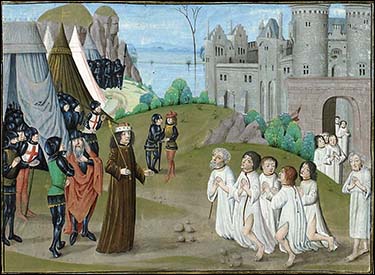
Strong emotion was excited among all the barons and knights who stood round, as they saw the resigned countenances,
pale and thin with patiently-endured hunger, of these venerable men, offering themselves in the cause of their
fellow-townsmen. Many tears of pity were shed; but the king still showed himself implacable, and commanded that they
should be led away, and their heads stricken off. Sir Walter Mauny interceded for them with all his might, even
telling the king that such an execution would tarnish his honor, and that reprisals would be made on his own
garrisons; and all the nobles joined in entreating pardon for the citizens, but still without effect; and the headsman
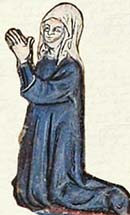 had been actually sent for, when Queen Philippa, her eyes streaming with tears, threw
herself on her knees amongst the captives, and said, "Ah, gentle sir, since I have crossed the sea with much danger
to see you, I have never asked you one favor; now I beg as a boon to myself, for the sake of the Son of the Blessed
Mary, and for your love to me, that you will be merciful to these men!"
had been actually sent for, when Queen Philippa, her eyes streaming with tears, threw
herself on her knees amongst the captives, and said, "Ah, gentle sir, since I have crossed the sea with much danger
to see you, I have never asked you one favor; now I beg as a boon to myself, for the sake of the Son of the Blessed
Mary, and for your love to me, that you will be merciful to these men!"
For some time the king looked at her in silence; then he exclaimed: "Dame, dame, would that you had been anywhere
than here! You have entreated in such a manner that I cannot refuse you; I therefore give these men to you, to do
as you please with." Joyfully did Queen Philippa conduct the six citizens to her own apartments, where she made them
welcome, sent them new garments, entertained them with a plentiful dinner, and dismissed them each with a gift of
six nobles. After this, Sir Walter Mauny entered the city, and took possession of it; retaining Sir Jean de Vienne
and the other knights and squires till they should ransom themselves, and sending out the old French inhabitants;
for the king was resolved to people the city entirely with English, in order to gain a thoroughly strong hold of
this first step in France.
The king and queen took up their abode in the city; and the houses of Jean Daire were, it appears, granted to the
queen—perhaps, because she considered the man himself as her charge, and wished to secure them for him—and
her little daughter Margaret was, shortly after, born in one of his houses. Eustache de St. Pierre was taken into
high favor, and was placed in charge of the new citizens whom the king placed in the city.
Indeed, as this story is told by no chronicler but Froissart, some have doubted of it, and thought the violent
resentment thus imputed to Edward III inconsistent with his general character; but it is evident that the men of
Calais had given him strong provocation by attacks on his shipping—piracies which are not easily forgiven—and
that he considered that he had a right to make an example of them. It is not unlikely that he might, after all,
have intended to forgive them, and have given the queen the grace of obtaining their pardon, so as to excuse himself
from the fulfillment of some over-hasty threat. But, however this may have been, nothing can lessen the glory of
the six grave and patient men who went forth, by their own free will, to meet what might be a cruel and disgraceful
death, in order to obtain the safety of their fellow townsmen.
Excerpted from:
Yonge, Charlotte M. "The Noble Burghers of Calais." The Junior Classics. Vol VII.
New York: P. F. Collier & Son, 1912. 99-113.
Other Local Resources:
Books for further study:
Allmand, Christopher. The Hundred Years War: England and France at War.
Cambridge University Press, 2005.
Seward, Desmond. The Hundred Years War: The English in France 1337-1453.
Penguin, 1999.
 | to Luminarium Encyclopedia |
Site ©1996-2023 Anniina Jokinen. All rights reserved.
This page was created on January 3, 2018. Last updated March 5, 2023.
|
Index of Encyclopedia Entries:
Medieval Cosmology
Prices of Items in Medieval England
Edward II
Isabella of France, Queen of England
Piers Gaveston
Thomas of Brotherton, E. of Norfolk
Edmund of Woodstock, E. of Kent
Thomas, Earl of Lancaster
Henry of Lancaster, Earl of Lancaster
Henry of Grosmont, Duke of Lancaster
Roger Mortimer, Earl of March
Hugh le Despenser the Younger
Bartholomew, Lord Burghersh, elder
Hundred Years' War (1337-1453)
Edward III
Philippa of Hainault, Queen of England
Edward, Black Prince of Wales
John of Eltham, Earl of Cornwall
The Battle of Crécy, 1346
The Siege of Calais, 1346-7
The Battle of Poitiers, 1356
Lionel of Antwerp, Duke of Clarence
John of Gaunt, Duke of Lancaster
Edmund of Langley, Duke of York
Thomas of Woodstock, Gloucester
Richard of York, E. of Cambridge
Richard Fitzalan, 3. Earl of Arundel
Roger Mortimer, 2nd Earl of March
The Good Parliament, 1376
Richard II
The Peasants' Revolt, 1381
Lords Appellant, 1388
Richard Fitzalan, 4. Earl of Arundel
Archbishop Thomas Arundel
Thomas de Beauchamp, E. Warwick
Robert de Vere, Earl of Oxford
Ralph Neville, E. of Westmorland
Thomas Mowbray, Duke of Norfolk
Edmund Mortimer, 3. Earl of March
Roger Mortimer, 4. Earl of March
John Holland, Duke of Exeter
Michael de la Pole, E. Suffolk
Hugh de Stafford, 2. E. Stafford
Henry IV
Edward, Duke of York
Edmund Mortimer, 5. Earl of March
Henry Percy, Earl of Northumberland
Sir Henry Percy, "Harry Hotspur"
Thomas Percy, Earl of Worcester
Owen Glendower
The Battle of Shrewsbury, 1403
Archbishop Richard Scrope
Thomas Mowbray, 3. E. Nottingham
John Mowbray, 2. Duke of Norfolk
Thomas Fitzalan, 5. Earl of Arundel
Henry V
Thomas, Duke of Clarence
John, Duke of Bedford
Humphrey, Duke of Gloucester
John Talbot, Earl of Shrewsbury
Richard, Earl of Cambridge
Henry, Baron Scrope of Masham
William de la Pole, Duke of Suffolk
Thomas Montacute, E. Salisbury
Richard Beauchamp, E. of Warwick
Henry Beauchamp, Duke of Warwick
Thomas Beaufort, Duke of Exeter
Cardinal Henry Beaufort
John Beaufort, Earl of Somerset
Sir John Fastolf
John Holland, 2. Duke of Exeter
Archbishop John Stafford
Archbishop John Kemp
Catherine of Valois
Owen Tudor
John Fitzalan, 7. Earl of Arundel
John, Lord Tiptoft
Charles VII, King of France
Joan of Arc
Louis XI, King of France
Charles the Bold, Duke of Burgundy
The Battle of Agincourt, 1415
The Battle of Castillon, 1453
The Wars of the Roses 1455-1485
Causes of the Wars of the Roses
The House of Lancaster
The House of York
The House of Beaufort
The House of Neville
The First Battle of St. Albans, 1455
The Battle of Blore Heath, 1459
The Rout of Ludford, 1459
The Battle of Northampton, 1460
The Battle of Wakefield, 1460
The Battle of Mortimer's Cross, 1461
The 2nd Battle of St. Albans, 1461
The Battle of Towton, 1461
The Battle of Hedgeley Moor, 1464
The Battle of Hexham, 1464
The Battle of Edgecote, 1469
The Battle of Losecoat Field, 1470
The Battle of Barnet, 1471
The Battle of Tewkesbury, 1471
The Treaty of Pecquigny, 1475
The Battle of Bosworth Field, 1485
The Battle of Stoke Field, 1487
Henry VI
Margaret of Anjou
Richard Plantagenet, Duke of York
Edward IV
Elizabeth Woodville
Richard Woodville, 1. Earl Rivers
Anthony Woodville, 2. Earl Rivers
Jane Shore
Edward V
Richard III
George, Duke of Clarence
Ralph Neville, 2. Earl of Westmorland
Richard Neville, Earl of Salisbury
Richard Neville, Earl of Warwick
Edward Neville, Baron Bergavenny
William Neville, Lord Fauconberg
Robert Neville, Bishop of Salisbury
John Neville, Marquis of Montagu
George Neville, Archbishop of York
John Beaufort, 1. Duke Somerset
Edmund Beaufort, 2. Duke Somerset
Henry Beaufort, 3. Duke of Somerset
Edmund Beaufort, 4. Duke Somerset
Margaret Beaufort
Edmund Tudor, Earl of Richmond
Jasper Tudor, Earl of Pembroke
Humphrey Stafford, D. Buckingham
Henry Stafford, Duke of Buckingham
Humphrey Stafford, E. of Devon
Thomas, Lord Stanley, Earl of Derby
Sir William Stanley
Archbishop Thomas Bourchier
Henry Bourchier, Earl of Essex
John Mowbray, 3. Duke of Norfolk
John Mowbray, 4. Duke of Norfolk
John Howard, Duke of Norfolk
Henry Percy, 2. E. Northumberland
Henry Percy, 3. E. Northumberland
Henry Percy, 4. E. Northumberland
William, Lord Hastings
Henry Holland, Duke of Exeter
William Fitzalan, Earl of Arundel
William Herbert, 1. Earl of Pembroke
John de Vere, 12th Earl of Oxford
John de Vere, 13th Earl of Oxford
Thomas de Clifford, 8. Baron Clifford
John de Clifford, 9. Baron Clifford
John Tiptoft, Earl of Worcester
Thomas Grey, 1. Marquis Dorset
Sir Andrew Trollop
Archbishop John Morton
Edward Plantagenet, E. of Warwick
John Talbot, 2. E. Shrewsbury
John Talbot, 3. E. Shrewsbury
John de la Pole, 2. Duke of Suffolk
John de la Pole, E. of Lincoln
Edmund de la Pole, E. of Suffolk
Richard de la Pole
John Sutton, Baron Dudley
James Butler, 5. Earl of Ormonde
Sir James Tyrell
Edmund Grey, first Earl of Kent
George Grey, 2nd Earl of Kent
John, 5th Baron Scrope of Bolton
James Touchet, 7th Baron Audley
Walter Blount, Lord Mountjoy
Robert Hungerford, Lord Moleyns
Thomas, Lord Scales
John, Lord Lovel and Holand
Francis Lovell, Viscount Lovell
Sir Richard Ratcliffe
William Catesby
Ralph, 4th Lord Cromwell
Jack Cade's Rebellion, 1450
Tudor Period
King Henry VII
Queen Elizabeth of York
Arthur, Prince of Wales
Lambert Simnel
Perkin Warbeck
The Battle of Blackheath, 1497
King Ferdinand II of Aragon
Queen Isabella of Castile
Maximilian I, Holy Roman Emperor
King Henry VIII
Queen Catherine of Aragon
Queen Anne Boleyn
Queen Jane Seymour
Queen Anne of Cleves
Queen Catherine Howard
Queen Katherine Parr
King Edward VI
Queen Mary I
Queen Elizabeth I
Henry Fitzroy, Duke of Richmond
Margaret Tudor, Queen of Scotland
James IV, King of Scotland
The Battle of Flodden Field, 1513
James V, King of Scotland
Mary of Guise, Queen of Scotland
Mary Tudor, Queen of France
Louis XII, King of France
Francis I, King of France
The Battle of the Spurs, 1513
Field of the Cloth of Gold, 1520
Charles V, Holy Roman Emperor
Eustace Chapuys, Imperial Ambassador
The Siege of Boulogne, 1544
Cardinal Thomas Wolsey
Archbishop Thomas Cranmer
Thomas Cromwell, Earl of Essex
Thomas, Lord Audley
Thomas Wriothesley, E. Southampton
Sir Richard Rich
Edward Stafford, D. of Buckingham
Thomas Howard, 2nd Duke of Norfolk
Thomas Howard, 3rd Duke of Norfolk
John Dudley, Duke of Northumberland
Charles Brandon, Duke of Suffolk
Thomas Boleyn, Earl of Wiltshire
George Boleyn, Viscount Rochford
John Russell, Earl of Bedford
Thomas Grey, 2. Marquis of Dorset
Henry Grey, D. of Suffolk
Charles Somerset, Earl of Worcester
George Talbot, 4. E. Shrewsbury
Francis Talbot, 5. E. Shrewsbury
Henry Algernon Percy,
5th Earl of Northumberland
Henry Algernon Percy,
6th Earl of Northumberland
Ralph Neville, 4. E. Westmorland
Henry Neville, 5. E. Westmorland
William Paulet, Marquis of Winchester
Sir Francis Bryan
Sir Nicholas Carew
John de Vere, 15th Earl of Oxford
John de Vere, 16th Earl of Oxford
Thomas Seymour, Lord Admiral
Edward Seymour, Protector Somerset
Margaret Pole, Countess of Salisbury
Henry Pole, Lord Montague
Sir Geoffrey Pole
Thomas Manners, Earl of Rutland
Henry Manners, Earl of Rutland
Henry Bourchier, 2. Earl of Essex
Robert Radcliffe, 1. Earl of Sussex
Henry Radcliffe, 2. Earl of Sussex
George Hastings, Earl of Huntingdon
Henry Courtenay, Marquis of Exeter
George Neville, Baron Bergavenny
Sir Edward Neville
William, Lord Paget
William Sandys, Baron Sandys
William Fitzwilliam, E. Southampton
Sir Anthony Browne
Sir Thomas Wriothesley
Sir William Kingston
George Brooke, Lord Cobham
Sir Richard Southwell
Thomas Fiennes, 9th Lord Dacre
Sir Francis Weston
Henry Norris
Lady Jane Grey
Sir Thomas Arundel
Sir Richard Sackville
Sir William Petre
Sir John Cheke
Walter Haddon, L.L.D
Sir Peter Carew
Sir John Mason
Nicholas Wotton
John Taylor
Sir Thomas Wyatt, the Younger
Cardinal Lorenzo Campeggio
Cardinal Reginald Pole
Stephen Gardiner, Bishop of Winchester
Edmund Bonner, Bishop of London
Nicholas Ridley, Bishop of London
John Hooper, Bishop of Gloucester
John Aylmer, Bishop of London
Thomas Linacre
William Grocyn
Archbishop William Warham
Cuthbert Tunstall, Bishop of Durham
Richard Fox, Bishop of Winchester
Edward Fox, Bishop of Hereford
Pope Julius II
Pope Leo X
Pope Clement VII
Pope Paul III
Pope Pius V
Pico della Mirandola
Desiderius Erasmus
Martin Bucer
Richard Pace
Christopher Saint-German
Thomas Tallis
Elizabeth Barton, the Nun of Kent
Hans Holbein, the Younger
The Sweating Sickness
Dissolution of the Monasteries
Pilgrimage of Grace, 1536
Robert Aske
Anne Askew
Lord Thomas Darcy
Sir Robert Constable
Oath of Supremacy
The Act of Supremacy, 1534
The First Act of Succession, 1534
The Third Act of Succession, 1544
The Ten Articles, 1536
The Six Articles, 1539
The Second Statute of Repeal, 1555
The Act of Supremacy, 1559
Articles Touching Preachers, 1583
Queen Elizabeth I
William Cecil, Lord Burghley
Robert Cecil, 1st Earl of Salisbury
Sir Francis Walsingham
Sir Nicholas Bacon
Sir Thomas Bromley
Robert Dudley, Earl of Leicester
Ambrose Dudley, Earl of Warwick
Henry Carey, Lord Hunsdon
Sir Thomas Egerton, Viscount Brackley
Sir Francis Knollys
Katherine "Kat" Ashley
Lettice Knollys, Countess of Leicester
George Talbot, 6. E. of Shrewsbury
Elizabeth, Countess of Shrewsbury
Gilbert Talbot, 7. E. of Shrewsbury
Sir Henry Sidney
Sir Robert Sidney
Archbishop Matthew Parker
Walter Devereux, 1st Earl of Essex
Robert Devereux, 2nd Earl of Essex
Penelope Devereux, Lady Rich
Sir Christopher Hatton
Edward Courtenay, E. Devonshire
Edward Manners, 3rd Earl of Rutland
Thomas Radcliffe, 3. Earl of Sussex
Henry Radcliffe, 4. Earl of Sussex
Robert Radcliffe, 5. Earl of Sussex
William Parr, Marquis of Northampton
Henry Wriothesley, 2. Southampton
Henry Wriothesley, 3. Southampton
Charles Neville, 6. E. Westmorland
Thomas Percy, 7. E. Northumberland
Henry Percy, 8. E. Northumberland
Henry Percy, 9. E. Nothumberland
William Herbert, 1. Earl of Pembroke
Charles, Lord Howard of Effingham
Thomas Howard, 4th Duke of Norfolk
Henry Howard, 1. Earl of Northampton
Thomas Howard, 1. Earl of Suffolk
Henry Hastings, 3. E. of Huntingdon
Edward Manners, 3rd Earl of Rutland
Roger Manners, 5th Earl of Rutland
Francis Manners, 6th Earl of Rutland
Henry FitzAlan, 12. Earl of Arundel
Thomas, Earl Arundell of Wardour
Edward Somerset, E. of Worcester
William Davison
Sir Walter Mildmay
Sir Ralph Sadler
Sir Amyas Paulet
Gilbert Gifford
Anthony Browne, Viscount Montague
François, Duke of Alençon & Anjou
Mary, Queen of Scots
Henry Stuart, Lord Darnley
James Hepburn, Earl of Bothwell
Anthony Babington and the Babington Plot
John Knox
Philip II of Spain
The Spanish Armada, 1588
Sir Francis Drake
Sir John Hawkins
William Camden
Archbishop Whitgift
Martin Marprelate Controversy
John Penry (Martin Marprelate)
Richard Bancroft, Archbishop of Canterbury
John Dee, Alchemist
Philip Henslowe
Edward Alleyn
The Blackfriars Theatre
The Fortune Theatre
The Rose Theatre
The Swan Theatre
Children's Companies
The Admiral's Men
The Lord Chamberlain's Men
Citizen Comedy
The Isle of Dogs, 1597
Common Law
Court of Common Pleas
Court of King's Bench
Court of Star Chamber
Council of the North
Fleet Prison
Assize
Attainder
First Fruits & Tenths
Livery and Maintenance
Oyer and terminer
Praemunire
The Stuarts
King James I of England
Anne of Denmark
Henry, Prince of Wales
The Gunpowder Plot, 1605
George Villiers, 1st Duke of Buckingham
Robert Carr, Earl of Somerset
Arabella Stuart, Lady Lennox
William Alabaster
Bishop Hall
Bishop Thomas Morton
Archbishop William Laud
John Selden
Lucy Harington, Countess of Bedford
Henry Lawes
King Charles I
Queen Henrietta Maria
Long Parliament
Rump Parliament
Kentish Petition, 1642
Thomas Wentworth, Earl of Strafford
John Digby, Earl of Bristol
George Digby, 2nd Earl of Bristol
Thomas Fairfax, 3rd Lord Fairfax
Robert Devereux, 3rd E. of Essex
Robert Sidney, 2. E. of Leicester
Algernon Percy, E. of Northumberland
Henry Montagu, Earl of Manchester
Edward Montagu, 2. Earl of Manchester
The Restoration
King Charles II
King James II
Test Acts
Greenwich Palace
Hatfield House
Richmond Palace
Windsor Palace
Woodstock Manor
The Cinque Ports
Mermaid Tavern
Malmsey Wine
Great Fire of London, 1666
Merchant Taylors' School
Westminster School
The Sanctuary at Westminster
"Sanctuary"
Images:
Chart of the English Succession from William I through Henry VII
Medieval English Drama
London c1480, MS Royal 16
London, 1510, the earliest view in print
Map of England from Saxton's Descriptio Angliae, 1579
London in late 16th century
Location Map of Elizabethan London
Plan of the Bankside, Southwark, in Shakespeare's time
Detail of Norden's Map of the Bankside, 1593
Bull and Bear Baiting Rings from the Agas Map (1569-1590, pub. 1631)
Sketch of the Swan Theatre, c. 1596
Westminster in the Seventeenth Century, by Hollar
Visscher's View of London, 1616
Larger Visscher's View in Sections
c. 1690. View of London Churches, after the Great Fire
The Yard of the Tabard Inn from Thornbury, Old and New London
|
|